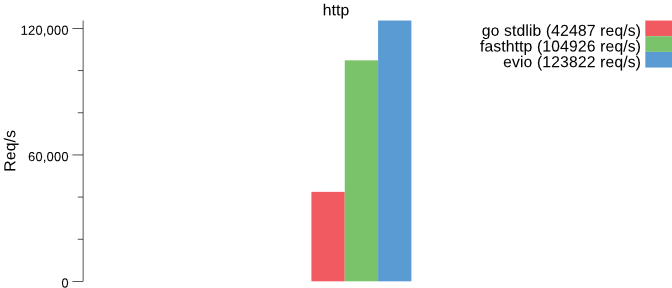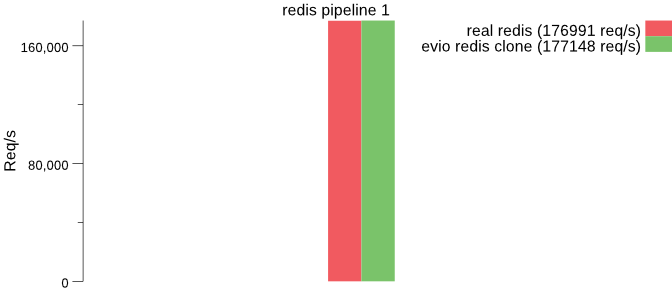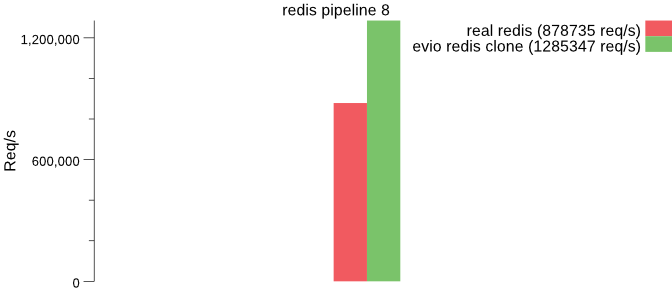|
|
||
|---|---|---|
| benchmarks | ||
| examples | ||
| internal | ||
| .travis.yml | ||
| LICENSE | ||
| README.md | ||
| evio.go | ||
| evio_loop.go | ||
| evio_net.go | ||
| evio_other.go | ||
| evio_test.go | ||
| evio_translate.go | ||
| logo.png | ||
README.md
evio is an event loop networking framework that is fast and small. It makes direct epoll and kqueue syscalls rather than using the standard Go net package, and works in a similar manner as libuv and libevent.
The goal of this project is to create a server framework for Go that performs on par with Redis and Haproxy for packet handling. My hope is to use this as a foundation for Tile38 and a future L7 proxy for Go... and a bunch of other stuff.
Just to be perfectly clear
This project is not intended to be a general purpose replacement for the standard Go net package or goroutines. It's for building specialized services such as key value stores, L7 proxies, static websites, etc.
You would not want to use this framework if you need to handle long-running requests (milliseconds or more). For example, a web api that needs to connect to a mongo database, authenticate, and respond; just use the Go net/http package instead.
There are many popular event loop based applications in the wild such as Nginx, Haproxy, Redis, and Memcached. All of these are single-threaded and very fast and written in C.
The reason I wrote this framework is so I can build certain network services that perform like the C apps above, but I also want to continue to work in Go.
Features
- Fast single-threaded event loop
- Simple API
- Low memory usage
- Supports tcp4, tcp6, and unix sockets
- Allows multiple network binding on the same event loop
- Flexible ticker event
- Fallback for non-epoll/kqueue operating systems by simulating events with the net package
- Ability to wake up connections from long running background operations
Getting Started
Installing
To start using evio, install Go and run go get:
$ go get -u github.com/tidwall/evio
This will retrieve the library.
Usage
Starting a server is easy with evio. Just set up your events and pass them to the Serve function along with the binding address(es). Each connections receives an ID that's passed to various events to differentiate the clients. At any point you can close a client or shutdown the server by return a Close or Shutdown action from an event.
Example echo server that binds to port 5000:
package main
import "github.com/tidwall/evio"
func main() {
var events evio.Events
events.Data = func(id int, in []byte) (out []byte, action evio.Action) {
out = in
return
}
if err := evio.Serve(events, "tcp://localhost:5000"); err != nil {
panic(err.Error())
}
}
Here the only event being used is Data, which fires when the server receives input data from a client.
The exact same input data is then passed through the output return value, which is then sent back to the client.
Connect to the echo server:
$ telnet localhost 5000
Events
The event type has a bunch of handy events:
Servingfires when the server is ready to accept new connections.Openedfires when a connection has opened.Closedfires when a connection has closed.Detachfires when a connection has been detached using theDetachreturn action.Datafires when the server receives new data from a connection.Prewritefires prior to all write attempts from the server.Postwritefires immediately after every write attempt.Tickfires immediately after the server starts and will fire again after a specified interval.
Multiple addresses
An server can bind to multiple addresses and share the same event loop.
evio.Serve(events, "tcp://192.168.0.10:5000", "unix://socket")
Ticker
The Tick event fires ticks at a specified interval.
The first tick fires immediately after the Serving events.
events.Tick = func() (delay time.Duration, action Action){
log.Printf("tick")
delay = time.Second
return
}
Wake up
A connection can be woken up using the Wake function that is made available through the Serving event. This is useful for when you need to offload an operation to a background goroutine and then later notify the event loop that it's time to send some data.
Example echo server that when encountering the line "exec" it waits 5 seconds before responding.
var srv evio.Server
var mu sync.Mutex
var execs = make(map[int]int)
events.Serving = func(srvin evio.Server) (action evio.Action) {
srv = srvin // hang on to the server control, which has the Wake function
return
}
events.Data = func(id int, in []byte) (out []byte, action evio.Action) {
if in == nil {
// look for `in` param equal to `nil` following a wake call.
mu.Lock()
for execs[id] > 0 {
out = append(out, "exec\r\n"...)
execs[id]--
}
mu.Unlock()
} else if string(in) == "exec\r\n" {
go func(){
// do some long running operation
time.Sleep(time.Second*5)
mu.Lock()
execs[id]++
mu.Unlock()
srv.Wake(id)
}()
} else {
out = in
}
return
}
Dialing out
An outbound connection can created by using the Dial function that is
made available through the Serving event. Dialing a new connection will
return a new connection ID and attach that connection to the event loop in
the same manner as incoming connections. This operation is completely
non-blocking including any DNS resolution.
All new outbound connection attempts will immediately fire an Opened
event and end with a Closed event. A failed connection will send the
connection error through the Closed event.
var srv evio.Server
var mu sync.Mutex
var execs = make(map[int]int)
events.Serving = func(srvin evio.Server) (action evio.Action) {
srv = srvin // hang on to the server control, which has the Dial function
return
}
events.Data = func(id int, in []byte) (out []byte, action evio.Action) {
if string(in) == "dial\r\n" {
id := srv.Dial("tcp://google.com:80")
// We now established an outbound connection to google.
// Treat it like you would incoming connection.
} else {
out = in
}
return
}
Data translations
The Translate function wraps events and provides a ReadWriter that can be used to translate data off the wire from one format to another. This can be useful for transparently adding compression or encryption.
For example, let's say we need TLS support:
var events Events
// ... fill the events with happy functions
cer, err := tls.LoadX509KeyPair("certs/ssl-cert-snakeoil.pem", "certs/ssl-cert-snakeoil.key")
if err != nil {
log.Fatal(err)
}
config := &tls.Config{Certificates: []tls.Certificate{cer}}
// wrap the events with a TLS translator
events = evio.Translate(events, nil,
func(id int, rw io.ReadWriter) io.ReadWriter {
return tls.Server(evio.NopConn(rw), config)
},
)
log.Fatal(Serve(events, "tcp://0.0.0.0:443"))
Here we wrapped the event with a TLS translator. The evio.NopConn function is used to converts the ReadWriter a net.Conn so the tls.Server() call will work.
There's a working TLS example at examples/http-server/main.go that binds to port 8080 and 4443 using an developer SSL certificate. The 8080 connections will be insecure and the 4443 will be secure.
$ cd examples/http-server
$ go run main.go --tlscert example.pem
2017/11/02 06:24:33 http server started on port 8080
2017/11/02 06:24:33 https server started on port 4443
$ curl http://localhost:8080
Hello World!
$ curl -k https://localhost:4443
Hello World!
More examples
Please check out the examples subdirectory for a simplified redis clone, an echo server, and a very basic http server with TLS support.
To run an example:
$ go run examples/http-server/main.go
$ go run examples/redis-server/main.go
$ go run examples/echo-server/main.go
Performance
Benchmarks
These benchmarks were run on an ec2 c4.xlarge instance in single-threaded mode (GOMAXPROC=1) over Ipv4 localhost. Check out benchmarks for more info.




Contact
Josh Baker @tidwall
License
evio source code is available under the MIT License.


